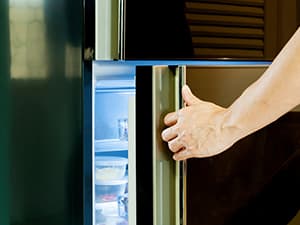Binge Eating Disorder Treatment
Ad
PsychGuides independently researches, tests, and reviews products and services which
may benefit our readers. Where indicated by "Medically Reviewed by", Healthcare professionals review articles for
medical accuracy. If you buy something through our links, or engage with a provider, we may earn a commission.

Binge eating disorder (BED) is a serious eating disorder characterized by frequently consuming large amounts of food and feeling unable to stop. BED is the most common eating disorder in the United States, affecting between 1-5% of the general population.2
Those struggling with BED should seek treatment as soon as possible. Early diagnosis and treatment offer the greatest chance of recovery.
This article answers the following questions about binge eating recovery and treatment options:
- Is there a cure for binge eating disorder?
- How does residential inpatient treatment for binge eating work?
- What kind of outpatient binge eating disorder treatment options are available?
- Are there binge eating disorder rehabs that provide luxury and executive amenities?
- Which therapies are effective for binge eating disorder?
- What prescription and over-the-counter medications can assist in binge eating recovery?
- What support groups and 12-step programs are available for binge eating recovery?
- Where can I find information on the best binge eating disorder treatment centers?
Is There a Cure for Binge Eating Disorder?
Binge eating disorder is a treatable condition.
The goals of binge eating disorder treatment are to:
- Stop or lessen binges.
- Help the person lose weight.
- Address underlying psychological problems related to the disorder.1
Treatment is tailored to the individual and should address the disorder itself as well as any concurrent medical or mental health issues.
Most binge eating recovery centers will use a multidisciplinary approach and have a variety of professionals on staff such as psychotherapists, psychiatrists, medical doctors, nurses, and dieticians. Check to see if your insurance provider covers binge eating treatment. Learn more about your relationship with food. Take the Do I Have An Eating Disorder Quiz today.
Need Help With an Eating Disorder? Virtual Online Treatment is Here!
Insurance Options Available.
Residential Inpatient Treatment
Residential binge eating disorder treatment centers can help people focus exclusively on their recovery. People in residential facilities commit to staying at the center for a designated duration, typically 30 to 90 days. Programs may be longer under certain circumstances.
During treatment, people have little contact with the outside world and have limited visits with friends and family. These requirements help assist with recovery.
Benefits of attending residential inpatient binge eating recovery centers include:
- 24-hour care and monitoring.
- Intensive, focused care.
- Therapy, nutritional counseling, support groups, and doctor visits all in one place.
- Any needed medication schedule can be prescribed and managed on site.
- Structured and rationed meals (no opportunity to binge eat).
- Daily routine to help minimize distraction, boredom, and triggers for relapse.
- Peer and professional support.
- Alternative or supplementary treatments (acupuncture, art therapy, etc.).
- Assistance with finding aftercare programs designed to prevent relapse.
Outpatient Treatment Programs
Outpatient binge eating disorder recovery centers allow people to continue to live at home and remain active in their personal, social, and professional lives.
Outpatient binge eating disorder rehab programs typically consist of the same types of treatment as inpatient facilities, but care takes place on a part-time basis. Some of the common treatment options available on an outpatient level include:
- One-on-one counseling.
- Group therapy.
- Support groups.
- 12-step programs.
- Nutritional counseling.
- Alternative or complementary therapies.
Not sure which type of treatment program is right for you? Call one of our recovery support advisors today at .
Luxury and Executive Facilities
 Luxury programs include many of the same treatment services as inpatient programs. However, they include extra amenities and are often located in desirable locations such as near the ocean or in the mountains.
Luxury programs include many of the same treatment services as inpatient programs. However, they include extra amenities and are often located in desirable locations such as near the ocean or in the mountains.
Many working professionals and business executives choose to attend a binge eating disorder treatment center that has executive facilities and amenities such as meeting rooms and work spaces.
These types of centers tend to have a higher cost than standard treatment options.
Although each recovery center is unique, some of the many amenities and services that may be provided at these facilities include:
- Private rooms.
- Gourmet meals and/or a personal chef.
- Room service.
- Scenic views and balconies in rooms.
- Massage and spa treatments.
- Fitness centers and sports facilities.
- Swimming pool(s) and hot tub(s).
- Complementary therapies.
- Golf courses.
- Horseback riding.
- Recreational equipment.
Therapies for Binge Eating Disorder
People struggling with BED may have a negative body image, shame, and low self-esteem, as well as other diagnosable mental health conditions such as anxiety and depression. Because the disorder can have such a negative impact on a person’s mental health, psychotherapy is a crucial component of binge eating disorder treatment in inpatient and outpatient rehab centers. Concerned about your mental health? Take an online depression quiz today.
Psychotherapy can help a person address negative emotions, improve self-esteem, and replace unhealthy eating habits with healthy coping skills and eating behaviors. Some of the common therapies available for BED include the following:1
- Cognitive behavioral therapy (CBT): CBT therapists typically address negative thoughts and feelings as well as treat mental health conditions such as anxiety and depression. They may also teach people how to regulate and control their eating patterns and find healthy ways to cope with stress in cases where food is used as a means of comfort.
- Interpersonal psychotherapy (IPT): IPT focuses on a person’s interpersonal relationships and how they relate to other people in their lives. IPT is useful for people with BED whose binge eating may be triggered or aggravated by interpersonal problems and unhealthy communication patterns.
- Dialectical behavior therapy (DBT): DBT is most commonly used as a treatment for borderline personality disorder. But it may also be effective at treating binge eating disorder. DBT can help people learn how to regulate emotions, improve relationships with others, better manage stress, and decrease the desire to overeat.
Weight Loss Programs
Weight loss programs are not recommended for people with BED because dieting may trigger more binge eating episodes.
If a person struggling with binge eating disorder chooses to undergo a weight loss program, they should do so under medical supervision to ensure they receive proper nutrition.1
If you’re ready to get help for binge eating disorder, call 1-888-997-3147 to learn more about your treatment options.
Prescription and Over-the-Counter Medications
Prescription and over-the counter medications that may be effective at treating binge eating disorder include:1
- Vyvanse: Vyvanse (lisdexamfetamine dimesylate) is a stimulant medication that is FDA-approved to treat binge eating disorder. Vyvanse is commonly prescribed to treat attention-deficit hyperactivity disorder (ADHD), but it also suppresses appetite. The drug has a high abuse potential, so it should be used cautiously. It also has a variety of common side effects such as insomnia and dry mouth.
- Antidepressants: Selective serotonin reuptake inhibitors (SSRIs) have been shown to reduce binge eating. Researchers speculate that its success may be due to the drug’s effects on serotonin, a neurotransmitter responsible for regulating mood.
- Topiramate: Topiramate is an anticonvulsant medication usually prescribed for the treatment of epilepsy and other seizure disorders. However, the medication has been shown to reduce binge eating. That said, the medication has side effects, such as kidney stones and vertigo.
People with binge eating disorder are at risk of abusing dietary supplements, weight loss pills, and herbal products. These medicines may also interact with prescribed medications or have potentially dangerous side effects. People suffering from BED should talk with their doctor before taking any of these. 1
Support Groups and 12-Step Programs
 Support is an essential component of binge eating disorder recovery, and several support groups and 12-step programs are available for binge eating. These programs use the same 12-step approach developed by Alcoholics Anonymous.
Support is an essential component of binge eating disorder recovery, and several support groups and 12-step programs are available for binge eating. These programs use the same 12-step approach developed by Alcoholics Anonymous.
Eating disorder 12-step programs provide a linear, step-by-step process toward recovery among the support of peers. People in these programs can seek out the help of a sponsor, who has completed recovery and provides added support. Many 12-step programs view binge eating disorder as a spiritual disease, but a person does not have to hold religious beliefs to participate.
Some of the most common 12-step programs available to those suffering from binge eating disorder include:
- Overeaters Anonymous: Overeaters Anonymous is a 12-step support program for people in recovery from binge eating disorder and other forms of compulsive eating. The goal of Overeaters Anonymous is abstinence from compulsive eating and unhealthy food behaviors achieved through strength, hope, peer support, and shared experiences.
- Compulsive Eaters Anonymous: Compulsive Eaters Anonymous is a fellowship program for anyone seeking recovery from compulsive eating problems such as binge eating and other related disorders.
- Food Addicts in Recovery Anonymous: Food Addicts in Recovery Anonymous is an international 12-step program that provides support to those who have experienced significant life difficulties from food and eating.
- Food Addicts Anonymous: Food Addicts Anonymous is a 12-step program that believes that food addiction is a biochemical disorder that cannot be cured through willpower or psychotherapy alone. Those suffering from binge eating disorder may benefit from this support group if their binge eating is related to food addiction.
How to Find the Best Binge Eating Disorder Treatment Centers
Binge eating disorder can lead to the development of several physical health complications such as high blood pressure, obesity, diabetes, and gallbladder disease. It can also cause emotional and mental health problems such as shame, anxiety, and depression.2
If you or someone you love is struggling with binge eating disorder, call our recovery support hotline at 1-888-344-8837 for information about binge eating disorder treatment centers near you.
Read next: Getting Help for Binge Eating Disorder
Sources
[1]. Mayo Clinic. (2016). Binge Eating Disorder.
[2]. National Eating Disorders Association (NEDA). Binge Eating Disorder.


